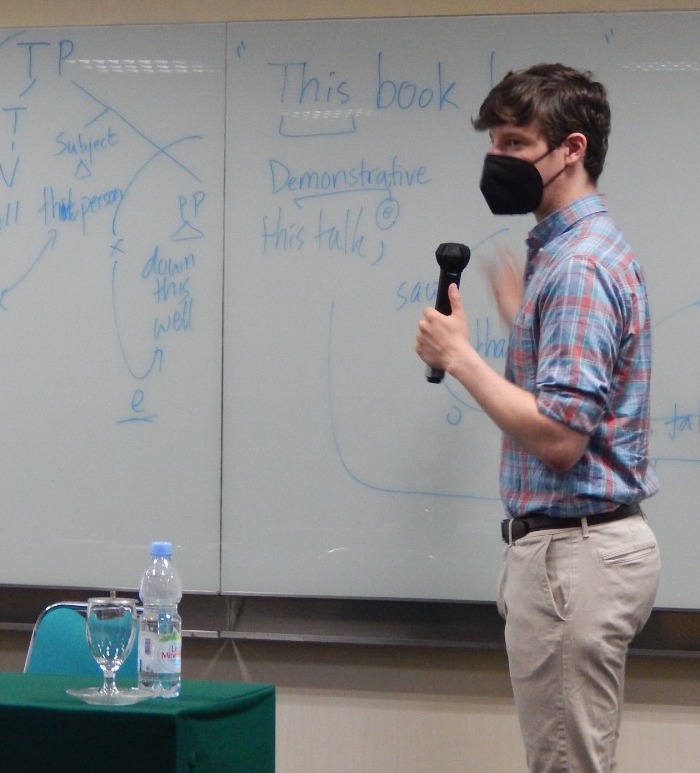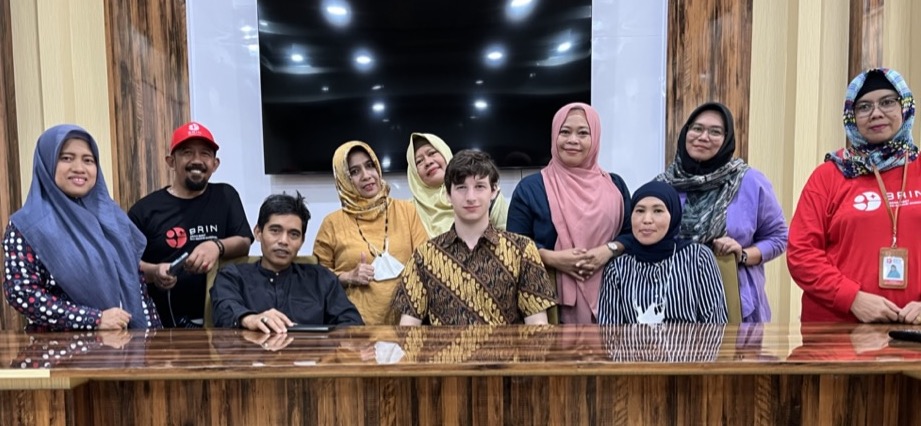Supporting Linguistics in Indonesia
Beyond conducting fieldwork, I take it as a major long-term goal to support the development of linguistics as a discipline in Indonesia. In the capital city, Jakarta, I have built tight relationships with the departments at the forefront of the field: the Applied Linguistics Department at Atma Jaya Catholic University and the English Department at Bina Nusantara University. At Atma Jaya, I have given talks on some of the main contributions of my research on Mandar: on second-position effects, rightward movement, and suppletion. At Bina Nusantara University, I have given both general and specialist talks on the value of linguistic research, focusing on language death and the theory of subjecthood. At both universities, I have also sat in on classes on syntax and served as a guest lecturer in each. In November 2023, I am planning to run a collaborative experiment on Mandar syntax with Yanti, the chair of linguistics at Atma Jaya.
 Beyond Jakarta, I have built connections with the broader linguistics scene and used my position to advocate for the importance of generative work. Most recently, I gave an invited talk at the National Agency for Research and Innovation on the value of generative theory for language description, focusing on the prosodic hierarchy [What's the Use of Generative Theory?]. Last year, I gave an invited talk at the Language Office of East Java on the relevance of generative work to language pedagogy, focusing on definiteness [Generative Linguistics at the Frontiers of Cross-Cultural Engagement]. In the same vein, I have given a set of talks to justify generative work to general audiences, presenting nontechnical but theoretically explicit investigations of subjecthood, the nature of movement, and metrical theory. In the fall of 2023, I also gave a talk on the importance of linguistics to contribute to a local project to found a linguistics department at the University of West Sulawesi, the primary university in the Mandar area.
Beyond Jakarta, I have built connections with the broader linguistics scene and used my position to advocate for the importance of generative work. Most recently, I gave an invited talk at the National Agency for Research and Innovation on the value of generative theory for language description, focusing on the prosodic hierarchy [What's the Use of Generative Theory?]. Last year, I gave an invited talk at the Language Office of East Java on the relevance of generative work to language pedagogy, focusing on definiteness [Generative Linguistics at the Frontiers of Cross-Cultural Engagement]. In the same vein, I have given a set of talks to justify generative work to general audiences, presenting nontechnical but theoretically explicit investigations of subjecthood, the nature of movement, and metrical theory. In the fall of 2023, I also gave a talk on the importance of linguistics to contribute to a local project to found a linguistics department at the University of West Sulawesi, the primary university in the Mandar area.
A major goal of this work is to raise the amount and quality of linguistic research that is conducted in Indonesia. This is a time-sensitive task, as Indonesia is home to over 700 native languages that all exist under severe pressure from the national language and many of which will soon disappear.
Collaboration in Sulawesi
Close engagement with Indonesian linguists is central to the task of documentation and analysis. To this end, I have built a tight relationship with the government body that is responsible for documentary work on Mandar and the other languages of the South Sulawesi Subfamily: the Language Office of South Sulawesi. In order to assist with research there in 2022, I ran an invited workshop on Praat, which introduced basic phonetic and phonological concepts and laid out the functionality of the software. In 2023, I ran a follow-up workshop that introduced the notion of a phonological phrase and set up a technical mechanism to detect its right edge in Mandar.

Most recently, I have launched a collaboration with one linguist from this office, Jusmianti Garing (Umi), to document syntactic microvariation across the languages most closely related to Mandar (those of the South Sulawesi Subfamily). In 2023, Umi and I conducted joint research in Makassar on the exponence and syntax of definiteness in the languages of South Sulawesi. The long-term goal of this collaboration is to build a set of theoretically-directed descriptive projects that can be replicated by the other language offices across Indonesia.
Constructing Corpora
To support further research, I have digitized and glossed the contents of every major publication on Mandar and created a searchable corpus for this language. I have also digitized and glossed the contents of the smaller set of publications on Mamuju, its closest relative, and created an analogous searchable corpus for that language as well. These corpora are now hosted on the public website Kratylos.
To continue this work, I have trained a graduate of the University of Indonesia, Jason Philip, to digitize and gloss further publications on the other langages of the South Sulawesi Subfamily in this way. Jason is currently digitizing and glossing the contents of several publications on Makassarese. Once this is complete, the Makassarese corpus will be made publically available on Kratylos as well.